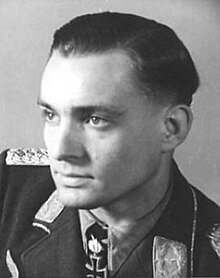Paul Zorner | |
|---|---|
 Paul Zorner | |
| Birth name | Paul Zloch |
| Born | 31 March 1920 Roben district of Leobschütz, Upper Silesia |
| Died | 27 January 2014 (aged 93) Homburg |
| Allegiance | |
| Service | Luftwaffe German Air Force |
| Years of service | 1939–45, 1956–57 |
| Rank | Major |
| Unit | KGr.z.b.v. 104 NJG 2, NJG 3, NJG 5, NJG 100 |
| Commands | 8./NJG 3, III./NJG 5, II./NJG 100 |
| Battles / wars | |
| Awards | Knight's Cross of the Iron Cross with Oak Leaves Order of Merit of the Federal Republic of Germany |
| Other work | mechanical engineering |
Paul Anton Guido Zorner, born Paul Zloch (31 March 1920 – 27 January 2014),[1] was a German night fighter pilot, who fought in the Luftwaffe during World War II. Zorner is credited with 59 night aerial victories claimed in 272 missions, including 110 night fighter missions.[2] Zorner was the ninth most successful fighter pilot in the Luftwaffe and in the history of aerial warfare.[3]
Born in 1920 to a large family, Zorner left school in 1938 to pursue a military career. He applied to join the Luftwaffe and was accepted as a Fahnenjunker (officer candidate) in October 1938. Zorner completed his training and was licensed to fly multi-engine aircraft. He was posted to 4. Staffel (squadron) Kampfgruppe zur besonderen Verwendung 104 (KGr. z.b.v. 104, Fighting Group for Special Use) to fly Junkers Ju 52 transports. Zorner participated in the Battle of Greece and Battle of Crete in April and May 1941. Zorner also operated in the Middle East flying supplies to Syria during the Anglo-Iraqi War. Zorner continued with the unit and from June to October 1941 flew in Operation Barbarossa, the invasion of the Soviet Union.
On 20 October 1941, Zorner transferred to the German night fighter arm. He completed his training as a night fighter pilot in July 1942 and was posted to Nachtjagdgeschwader 2. On 3 October 1942, Zorner was posted to 10. Staffel (squadron) Nachtjagdgeschwader 3 (NJG 3, Night Fighter Wing 3). Zorner claimed his first victory on 17 January 1943 and on 3 March, achieved the five victories necessary to qualify as a night fighter ace (Experte). On 9 September 1943 he was appointed Staffelkapitän (squadron leader) of 8./NJG 3 after achieving 12 victories. Zorner achieved his 20th victory on 3 January 1944 and was awarded the German Cross in Gold on 20 March 1944 for 35 night victories.
On 4 April 1944, Zorner was appointed Gruppenkommandeur (Group Commander) of III./Nachtjagdgeschwader 5 (NJG 5). On 9 June, Zorner was awarded the Knight's Cross of the Iron Cross for 48 bombers destroyed. Zorner was awarded the Knight's Cross of the Iron Cross with Oak Leaves on 17 September 1944. Zorner was appointed Gruppenkommandeur of II./NJG 100 on 13 October 1944 and remained the commanding officer until May 1945. Zorner achieved his 59th, and last, a victory on 5/6 March 1945.
Zorner surrendered to United States Army forces on 8 May 1945. Zorner and his unit were handed over to the Red Army on 17 May and he remained a prisoner in the Soviet Union until December 1949. After his release he studied engineering and retired in 1981. Zorner died in January 2014 aged 93.
- ^ Bowman 2016, p. 243.
- ^ Williams 2011, p. 160.
- ^ Williams 2011, p. 215.